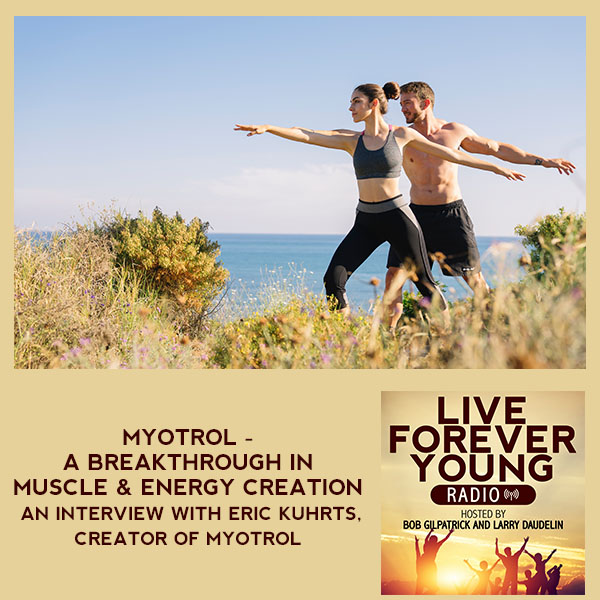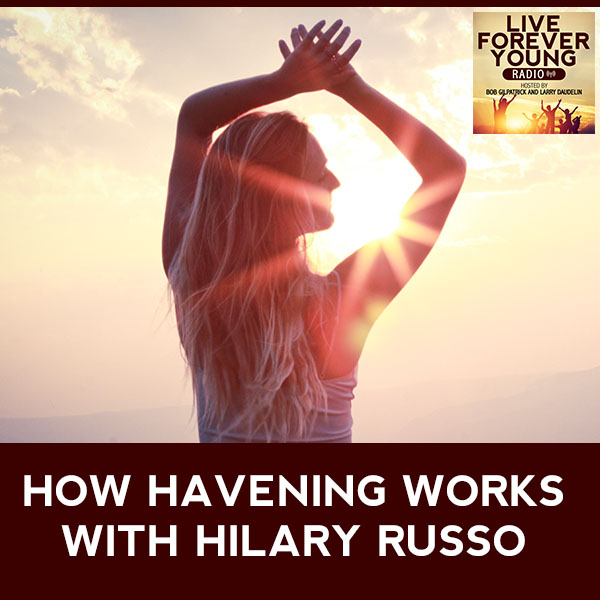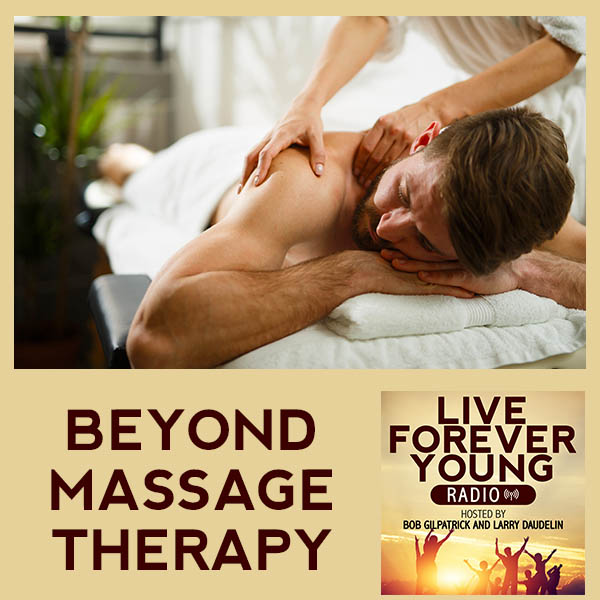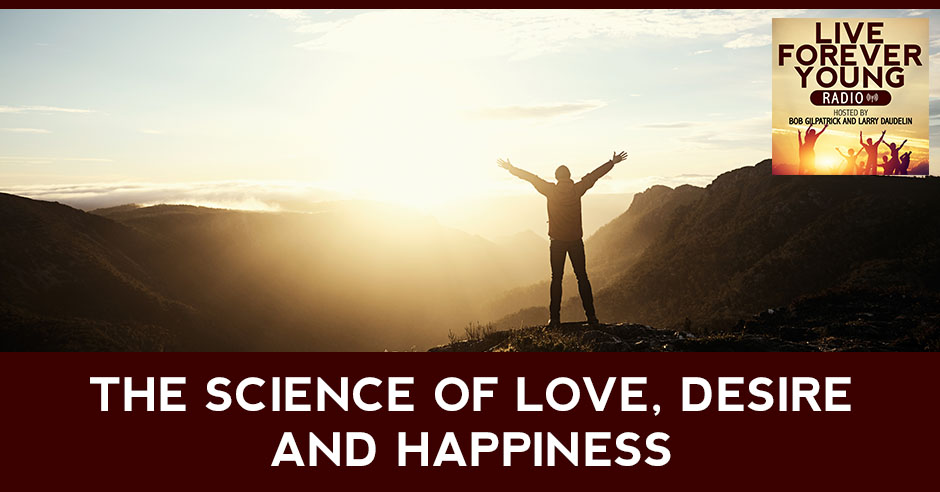
Love is not just a feeling. It’s a whole chemical process inside our bodies that changes and evolves as time passes. In this episode, Bob Gilpatrick and Rollie Culp explore the science of love and how understanding that process can help foster long-term, meaningful relationships. The two discuss the physical and chemical reactions and changes that occur in the brain and body when these emotions are triggered. There is a shift in our brain chemistry when we fall in love and another change when that new love transitions into lasting love. It’s up to us to navigate that transition and keep the fire of love burning. Bob and Rollie also share the two magic questions that, when acted upon, will help everyone improve their relationships and have lasting love, desire, and happiness. You don’t want to miss this episode.
—
Watch the Podcast Here:
Listen to the podcast here
The Science of Love, Desire and Happiness
Fostering Meaningful Relationships
Have you ever thought you were in love at first sight? There’s a reason for that. In this show, we will be exploring the science of love, desire, and happiness. Bob and Rollie discussed the physical and chemical reactions and changes that occur in the brain and body when these emotions are triggered. They also share some great tips that you can use to help foster meaningful relationships in your life and share the two magic questions that can help everyone improve and strengthen personal relationships. So sit back, relax, and get ready to live forever young.”
—
Rollie, how are you?
I’m doing good, Bob. How’s it going, man?
I’m doing well. In this episode, we’re going to talk about the topic of love, and desire and how it’s associated with happiness. We’re going to talk about the neurotransmitters that are activated when you have a new love and what happens as it progresses into lasting love and how the brain changes. We’re going to talk about exercise, circulation, stress management communications, and finally, two magic questions that will help everyone improve their relationships so that they have more lasting love, desire, and happiness. How does that sound?
That sounds great. If I could just get those two questions, it would probably make my day.
We will make sure we get to it. To start with, we know from research that different things happen in people’s brains when they first meet someone that they think they’re falling in love with. Also, we know how their brain chemistry changes over time if they’re lucky enough for it to move into lasting love. The first thing to know is what goes up in terms of the neurotransmitters when people have this new love. The one thing that goes up is your dopamine. Dopamine is associated with the reward center. It’s the same thing where people get addicted to sugar and drugs. It’s the same receptors in the brain when people fall in love so they have this addiction to it.
In addition, their cortisol rises, which is associated with stress. It’s a little bit stressful. When you have this new love, you’re worried about maybe I shouldn’t talk about this or that in general. The general rule is you don’t talk about your crazy uncle that lives in the basement on the first date. That will raise your cortisol. Another thing that happens is a neurotransmitter called norepinephrine goes up. It makes you feel joyful and less hungry. You eat less. You know how people would say, “I’m so in love and I can’t even eat.” That’s from norepinephrine.
There’s a song that goes, “I don’t want to eat. I don’t want to sleep. I just want to keep on loving you.”
Now, serotonin goes down. When your serotonin goes down, you tend to be hopeful but you also tend to have obsessive-compulsive and preoccupying thoughts. That’s why people say, “I can’t think of anything. I can’t get any work done. All I can do is think about this new love.” It’s because your serotonin goes down. When people have low serotonin, in general, they’re prone to obsessive-compulsive disorder. This is just what happens.
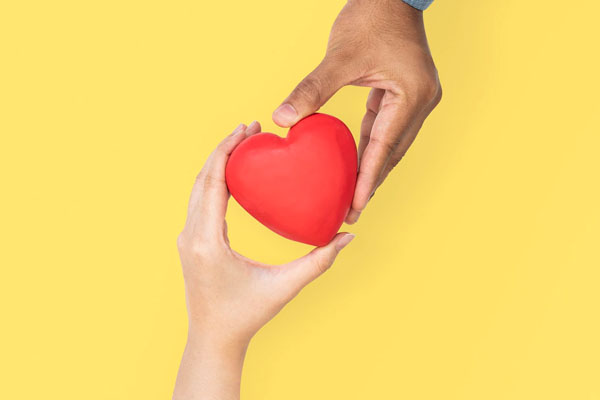
Science of Love: There are certain things that we can do that will allow is to have the deep satisfaction of a lasting love but maintain some of that new love at the same time.
You hear a lot about the commercials for bipolar disorder and stuff. People get obsessive about it. It must have an issue with serotonin production.
That’s partly it. If people then stay together for a while and it begins to transition, some of these neurotransmitters begin to return to normal. By then, another neurotransmitter tends to go up and stay slightly elevated, which is oxytocin. It’s a molecule of love and compassion. It’s this longer-term compassion and love that’s not quite the same as the new love that’s obsessed and you can’t eat. It’s not the same as the new love, but there are certain things that we can do that will allow us to have the deep satisfaction of lasting love, but maintain some of that new love at the same time.
One of the things that help to maintain some of that new love is exercise. Exercise changes the whole way that you feel about yourself. It changes your hormones so that as you’re more active, you feel more attractive yourself. If your partner is exercising, they feel more attractive. There are actual studies related to body mass index that shows that desire towards another human being is elevated the lower their body mass index is up to a certain point.
It’s very good to exercise and maintain an ideal body mass index. This helps. The other thing that’s important for numerous aspects of your body is circulation. It helps with exercise. Good circulation helps with blood flow to your brain and all throughout your body. It’s good to know what it is that helps with circulation and we did a whole episode on it.
It’s called The Importance of Circulation For Your Health With Ann Harrison.
People can read that whole episode, but in general, we talk about a special circulation mat that people can get. We talked about the compounds that are in our product called The Importance of Circulation For Your Health With Ann Harrison, including arginine and phosphatidylcholine.
Also, trimethylglycine.
All things that tend to help with circulation and the strength of your heart, are branched-chain amino acids, regular amino acids, and the like.
One of the things that really helps maintain some of that new love is exercise. Share on XAll those good vitamins help strengthen it, increase circulation, and then you can get back to exercising and stuff.
Once you feel more energy, you will feel well from better circulation. You’ll feel like exercising and it helps build upon this whole strategy for maintaining this long-term love coupled with the initial sensation and excitement of the new love. Another big thing is stress management. Nothing will wreck romance more than stress that might lead to arguments.
We know that in order to manage your stress, you have to manage your general readiness to believe whether or not things are okay. People, in general, tend to get carried away with the idea that things are not okay. Some people call it awfulizing. The average American says that 95% of the time is of the belief that things are not okay. There are strategies for dealing with this, and we’ve done an episode on finding your inner balance.
Finding your inner balance is good. We walk you through the actual app and how you will use it on your phone. If you guys haven’t got a chance to use it, it talks about the little thing that clips on your ear and it checks your heart rate. It syncs it up. You’d need to check that out if you haven’t, How To Achieve Inner Balance.
There is another one we’ve done on havening.
It’s called What is Havening? The Power Of Touch.
It’s another very effective technique for changing the amount of time you have this background belief that things are okay or not. It’s also very effective for specific incidents or specific types of beliefs that are causing triggers that trigger stress from times in the past like PTSD. Havening is good for creating a permanent interruption.
In that episode about havening that we did, it goes a lot into that. It gets to some details. Go check that out.

Science of Love: OFNER: Observation, Feelings, Needs, Reasonable Requests
In relationships, especially longer-lasting ones, people will discover, “This person has got these triggers that relate to their childhood, upbringing, and time in the military. Something occurred so they have this hair-trigger temper or they overreact to things. I’m not so sure this is the right person for me.” Havening helps people to eliminate those aspects of overreacting or triggers that can have a detrimental effect on a loving relationship.
A lot of times, that’s where it stems from because the stress causes an argument. It takes us to our next thing, which is communication. As they say, communication is key.
We have a whole episode on non-violent communication.
It’s called How To Use Nonviolent Communication.
Nonviolent Communication is the name of a book written by Marshall Rosenberg. This is a great book for a couple to study together. Sit together, begin reading it, begin practicing it, and then talk with each other about it. This is a technique that changes our primary representational system and what we’re focused on to one of the feelings towards the kinesthetic.
Oftentimes, when people are communicating, they’re listening. At the same time, their brain is fast-forwarding ahead and they have a pre-programmed response. They can’t wait to get out. Sometimes it gets blurted out even before the person’s done speaking and you’re interrupting, which can cause a lot of anxiety in the person that was hoping to be heard in totality.
The acronym for nonviolent communications is OFNR. The O is Observe without interrupting and without judgment, simply listen. While you’re listening and watching, try to listen and watch for what the other person is feeling. When they’re done speaking, instead of interjecting something like, “I know how to fix that for you. Do this.” The response then goes from the Observation, the O, to the F which is Feelings.
You would say, “It seems to me like you’re feeling disappointed.” The person then can reply back, “That’s exactly it,” or they can say, “It is disappointing, but it’s also this.” You’re going to move to the N which is the Needs. “You’re feeling disappointed. Perhaps it might mean that you need more of this, less of this, or something new.” It’s a suggestion and the other person might say, “That’s exactly what I need. What I need is this.”
Nothing will wreck romance more than stress. Share on XBecause it’s a conversation between two people, most of the time, it’s a need related to the other person. “I need you to do this. I need you to not do this.” The R at the end of OFNR is for a reasonable request and it’s also respectful. It can come in the terms of, “In order for me to have this need met, I would like to request that you do this or you don’t do this.” You have OFNR. If the person can agree to that request because it’s reasonable, it’s small and incremental. It’s not like, “You have to change everything about yourself by 2:00 or pack your stuff.”
It’s a reasonable request. “Please don’t ever use this word again when we’re discussing this because that is an unacceptable word to use.” “I can promise that I won’t do that anymore. I respect your need for me to do that. I’m anticipating that both of us are going to feel better after this conversation.” That’s in the Nonviolent Communication. It’s about a 200-page book and enjoyable to learn to use this NVC.
You can check out our show on BoomerBoost.com. If you guys like what we’re talking about, let us know about some other topics. Give us a like and subscribe to our YouTube channel too. That would be great. We’re going to be coming up with new topics. We’re keeping going. Again, if you guys have anything you want to hear about or anything that you think we should cover, go ahead and write us an email at BoomerBoost@BoomerBoost.com. Even if you just have comments about the show, how to make it better, or anything we could do, we would love to hear from you guys.
Rollie, one last part to this. We promised we would talk about the two magic questions. Imagine again, it’s a couple because we’re talking about love, desire, and happiness. This can even be with your children. There are a couple of questions and the first one starts with the phrase, “What are the most important things for you about blank?” In this case, we could use the words, “a relationship.” What are the most important things for you about a relationship? The other person might say something like, “Respect is important for me, trust, and also love.
You make note of this. Some people will even write it down when they first do this in a relationship. The follow-up question is, “What exactly would have to happen in order for you to feel that blank is being accomplished?” Depending on the word, you change it a little. We’ll use the word love. What exactly would happen for you to feel loved by me? You let them think about it and say what it is.
You’re going to get different answers from different people. One person might say, “I would feel loved if you hold my hand when we’re out in public.” Another person might say, “Flowers are my favorite thing and I would like you to bring me flowers. That will show me that you love me.” The other might be, “I’ll feel loved if I know I can trust you.” It might go to the next thing and you could say, “What exactly would have to happen for you to feel that I’m trustworthy?” The exact is very important.
If you feel it in your heart that you can comply or help the other person in this regard, you can repeat back. “Let me see if I’ve got this straight. What’s most important to you about a relationship is love, respect, and trust. What would have to happen for you to feel loved is I’ll hold your hand in public. I’m bringing you flowers and I will be trustworthy. It means this and this.”
This is the important time to re to return these words exactly as the other person said. This is not a time to paraphrase. If you paraphrase, the person will go, “That’s not what I said.” Just like with Nonviolent Communication, give time for feedback because people will modify and add. They go, “I said it was this, but what I meant was this.” It’s like, “What you meant was in the specific words back.”

Science of Love: This is not a cute thing. This is a solemn commitment toward understanding to lead to more long-lasting love.
Now, you’re on the same page and there’s no amorphous, “I didn’t know. I didn’t understand. You should have told me.” This is very specific communication so that people understand each other deeply and have a respectful statement that says, “I can do all these things. I understand what it is that will make you feel that I love you and that you trust me.” This makes this commitment.
When people say, “We’re going to make a commitment in the relationship.” Usually, people are referring to, “I’m committed to you and it’s a lifelong thing.” What makes somebody want to make a commitment of that magnitude? It’s because of the small commitments that lead to that. I’m committed to showing you I love you. I’m committed to being trustworthy. Those commitments that are stacked up and demonstrated over time in real-time, that’s what lead to the bigger commitment. “This is someone I want to spend my life with because.”
Those questions are really valuable. You can also add at the end of this conversation where you can say, “In regard to the trust thing, what is it that I should never do? Also, what is it that I should always do?” The never and always might not come out in the first two questions, but to make doubly sure, let’s get it straight. What should I always do to be trustworthy? What is it that I should never do? If I am to be trustworthy, what is it that I should never do?
While you’re having the conversation, you might as well define it.
This works very well with your children also. You’ll get incredible answers from children in response to these questions. What should a parent always do and what should a parent never do?” The parent says to the child, “What should a child always do and what should a child never do?” You’d be amazed at the answers that come out when those questions are asked.
Some of them are funny and some of them are deeply profound. A child might say, for example, “A child should never commit suicide,” and that’s profound. If people are going to use these communication strategies, this is not a cute thing, “We’re going to sit down and have a chat.” This is a solemn commitment toward understanding to lead to more long-lasting love.
If you pronounce it and intend it sincerely in your heart, it can be a solemn pronouncement, “I understand and I will never do this. I will always do this. I always promise to listen fully to what you’re feeling and do my best to accommodate your needs in regard to your feelings.” What a beautiful platform to build off of for a relationship that can hopefully be long-lasting. Because it’s so deeply committed, it also leads to a continual new love sensation. It’s like, “I’m falling in love with this person over and over again every day because of these things, 2, 3, 4, 5, and 6.”
It’s good because a lot of the time relationships get to a point and people stop working on them and there’s not even an iota of communication. What you’re talking about with the old love and the new love thing, if there’s a way to get back out of that funk, this would be one of them.
Rollie, thank you. I want to thank everybody for tuning in. We’ll see you over the next show.
Important Links
- The Importance of Circulation For Your Health With Ann Harrison – previous episode
- Boomer Boost
- How To Achieve Inner Balance – previous episode
- What is Havening? The Power Of Touch – previous episode
- How To Use Nonviolent Communication – previous episode
- Nonviolent Communication
- YouTube – Boomers Forever Young
- BoomerBoost@BoomerBoost.com




